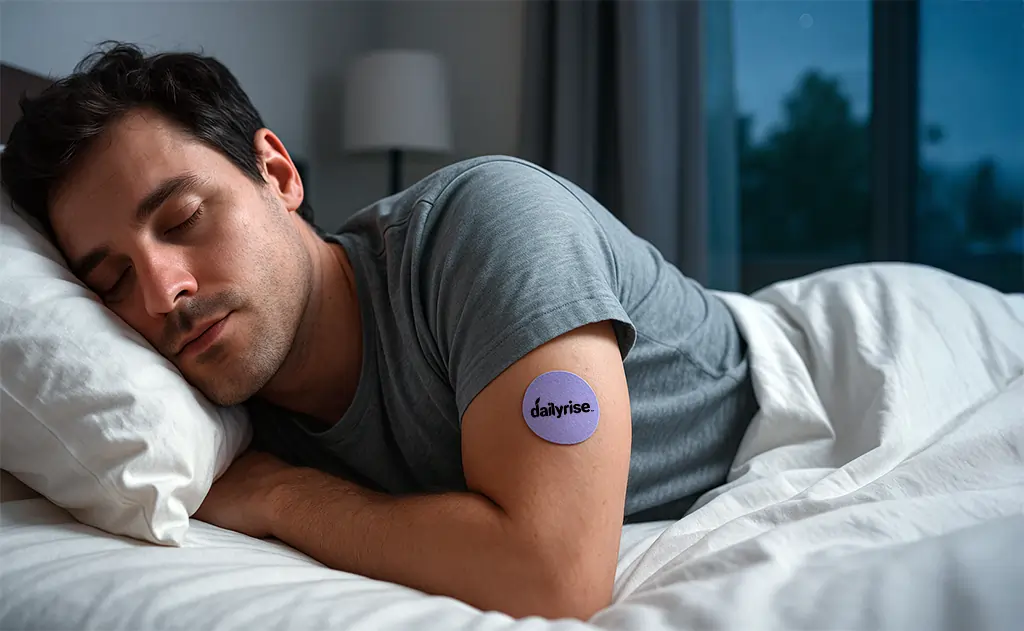Why Does It Take Me So Long To Fall Asleep?

If you find yourself lying awake each night, watching the minutes tick by, you’re not alone. Difficulty falling asleep is a widespread issue affecting people of all ages. This guide explores the most common reasons behind delayed sleep onset and offers practical, science-backed strategies to help you reclaim your rest.
Causes of Insomnia
Understanding the Root of Sleepless Nights
Insomnia is one of the most common sleep disorders, affecting millions across the UK. It refers to difficulty falling or staying asleep, often due to stress, lifestyle habits, or underlying health conditions. You might lie in bed for hours, wondering why sleep just won’t come, this could be your body’s response to overactivity, hormonal fluctuations, or an irregular daily schedule. Genetics and certain medications may also contribute. Since insomnia can be unpredictable, understanding the cause is the first step toward achieving consistent, restful sleep.
Trouble Falling Asleep at Night
What Happens When Your Brain Won’t Switch Off
Difficulty falling asleep often stems from racing thoughts or overstimulation. Whether it’s work concerns, personal worries, or simply a busy mind, mental chatter can delay your transition into slumber. Your body might feel tired, yet your brain refuses to power down. Reducing daily overstimulation, especially from screens, can help. Creating a calming evening ritual like meditation or light reading may cue your brain that it’s time to rest.
Effects of Poor Sleep Hygiene
How Daily Habits Can Disrupt Sleep
Sleep hygiene includes the practices and habits that promote good sleep. Consuming caffeine late in the day, irregular sleep schedules, and screen use in bed are just a few common culprits. Even eating large meals or exercising late in the evening can affect your ability to fall asleep. Enhancing your sleep hygiene with small, intentional changes—like dimming lights, creating a sleep-friendly bedroom, and winding down with relaxing activities can make a noticeable difference.
Anxiety and Sleep Problems
The Vicious Cycle of Worry and Wakefulness
Anxiety and sleep are deeply interconnected. When your nervous system is on high alert, falling asleep can feel impossible. Persistent worries and intrusive thoughts may keep your mind active, even if your body feels ready for bed. Over time, the anxiety surrounding sleep itself can become a barrier. Practising mindfulness, deep breathing, or progressive muscle relaxation can reduce bedtime anxiety and improve sleep onset.
Impact of Screen Time on Sleep
Blue Light and Brain Stimulation
Digital screens emit blue light, which interferes with the production of melatonin—the hormone responsible for making you feel sleepy. Beyond the light itself, stimulating content can keep your mind active well past bedtime. Reducing screen exposure at least an hour before bed and replacing it with soothing activities—like journaling or a warm bath—can help reset your internal cues for sleep.
How Your Diet Affects Sleep
Food Choices That May Influence Rest
Your eating habits can have a surprising effect on sleep. Caffeine, sugar, and heavy meals too close to bedtime may keep you awake. Foods like dark chocolate and spicy dishes can also be culprits. On the other hand, magnesium-rich foods like leafy greens and whole grains, or tryptophan-containing foods like oats and turkey, may support melatonin production. Staying hydrated, but not overly so, can also reduce night-time disruptions.
Best Natural Sleep Aids
Exploring Gentle Options to Support Sleep
Gentle sleep aids such as chamomile tea, magnesium supplements, and essential oils like lavender can be helpful. Aromatherapy, meditation apps, and white noise machines have also become popular. Among modern options, transdermal solutions like Dailyrise Sleep Patches are gaining recognition for delivering a slow, steady release of ingredients like melatonin or magnesium—ideal for a non-disruptive bedtime routine.
Establishing a Healthy Sleep Routine
The Power of Consistency
Your body thrives on routine. Going to bed and waking up at the same time every day—even on weekends—can reinforce your circadian rhythm. Build a predictable sequence of calming activities before bed: turning off electronics, stretching, brushing your teeth, and using a sleep patch. These steps act as cues for your brain, preparing it for rest and reducing resistance to sleep.
How Sleep Patches Work
The Science Behind Transdermal Sleep Support
Sleep patches deliver calming nutrients through the skin using transdermal technology. Ingredients like melatonin and magnesium are absorbed slowly over time, bypassing the digestive system. This steady release can support sleep onset and continuity without causing grogginess. Dailyrise Sleep Patches are discreet, travel-friendly, and easy to use—ideal for those looking for natural, non-habit-forming solutions.
Tips for Falling Asleep Faster
Simple Strategies That Can Make a Difference
Try combining several of the following strategies:
- Avoid caffeine after 2 p.m.
- Make your bedroom cool, dark, and quiet
- Use relaxation techniques like body scanning or deep breathing
- Limit screen time before bed
- Stick to a consistent bedtime
- Use white noise or calming music
- Incorporate Dailyrise Sleep Patches for gentle support Creating a consistent wind-down routine is key to telling your body it’s time to sleep.
Hormonal Imbalances and Sleep
How Your Internal Clock Can Be Thrown Off
Hormones like melatonin and cortisol regulate your sleep-wake cycle. Stress, menopause, thyroid disorders, or blood sugar imbalances can all disrupt these rhythms. Symptoms like night sweats, mood swings, or waking too early may signal a hormonal cause. Speak to a healthcare professional if hormonal imbalance is suspected, and consider using non-invasive supports such as herbal supplements or sleep patches.
Stress and Cortisol Levels
Why Chronic Stress Keeps You Awake
Cortisol—the body’s stress hormone—is meant to keep you alert during the day. When levels stay elevated into the evening, they can interfere with your ability to fall asleep. Chronic stress from work, finances, or personal matters can keep cortisol levels high. Evening rituals like journaling, gratitude lists, or gentle stretching may help lower stress. Many people also find comfort in using calming aids like Dailyrise Sleep Patches.
The Role of Exercise in Sleep
Moving Your Body for Better Rest
Exercise is one of the most powerful natural sleep aids. It reduces stress, improves mood, and helps regulate hormones. However, intense workouts too close to bedtime may delay sleep. Aim for moderate activity earlier in the day or opt for gentle movement, like stretching or yoga, in the evening. Physical activity also promotes deeper, more restorative sleep cycles.
The Bedroom Environment
Creating a Sleep-Inducing Space
Your bedroom should feel like a sanctuary for rest. Cool temperatures, blackout curtains, and reduced noise all signal to your brain that it’s time to sleep. Consider neutral colours, minimal clutter, and scents like lavender to enhance relaxation. A supportive mattress, breathable bedding, and soft lighting can further improve your sleep environment.
The Circadian Rhythm Explained
Understanding Your Body’s Internal Clock
Your circadian rhythm regulates the timing of sleep and wakefulness. It responds to environmental cues—especially light. Jet lag, shift work, or inconsistent sleep habits can throw it off. Morning exposure to natural light and dimming lights in the evening help reinforce your rhythm. A consistent sleep schedule also helps your body perform vital functions more efficiently.
The Link Between Sleep and Mental Health
Why Emotional Wellbeing Affects Rest
Sleep and mental health are closely linked. Anxiety, depression, and stress can all disrupt sleep, while poor sleep can worsen emotional wellbeing. Improving sleep may help enhance resilience, focus, and mood. Supportive strategies include therapy, journaling, mindfulness, and using products like Dailyrise Sleep Patches to ease into rest more gently.
The Importance of Melatonin
The Hormone That Prepares You for Sleep
Melatonin is your body’s natural sleep signal. It begins rising in the evening to cue your body for bed. Blue light from screens, late-night stress, or inconsistent routines can delay this process. Melatonin supplements and patches may help regulate your rhythm, especially if your natural levels are disrupted by travel or lifestyle habits.
Napping and Sleep Onset
Can Daytime Sleep Make Night Sleep Worse?
Naps can be helpful if kept short and early in the day. A 10–20-minute nap before 3 p.m. can improve alertness without affecting night-time sleep. Long or late naps, however, may confuse your circadian rhythm. If you’re struggling to fall asleep at night, consider limiting or eliminating naps to reset your natural sleep drive.
Alcohol and Sleep Quality
Why That Nightcap Might Backfire
Although alcohol might make you drowsy initially, it interferes with REM sleep—the most restorative stage. It can also lead to nighttime awakenings and poor sleep quality. Reducing or avoiding alcohol in the evening and opting for non-alcoholic alternatives like herbal teas can help improve sleep continuity and depth.
Supplements for Sleep Support
What Science Says About Natural Sleep Boosters
Natural supplements like magnesium, melatonin, valerian root, and L-theanine are commonly used to support sleep. These ingredients may help calm the mind and promote sleep onset. Transdermal delivery via Dailyrise Sleep Patches ensures a slow, steady release of ingredients without the need for swallowing pills. Choose options that are gentle, non-habit-forming, and designed to complement your natural sleep cycle.
Supplements for Sleep Support
What Science Says About Natural Sleep Boosters
Natural supplements like magnesium, melatonin, valerian root, and L-theanine are commonly used to support sleep. These ingredients may help calm the mind and promote sleep onset. Transdermal delivery via Dailyrise Sleep Patches ensures a slow, steady release of ingredients without the need for swallowing pills. Choose options that are gentle, non-habit-forming, and designed to complement your natural sleep cycle.
Sleep and Gut Health
How Your Digestive System Can Influence Sleep
Emerging research suggests that gut health may play a role in sleep regulation. A balanced gut microbiome helps produce neurotransmitters like serotonin, which affects melatonin levels. Poor digestion, bloating, or irregular eating habits can impact sleep quality. Supporting gut health with probiotics, prebiotics, and a high-fibre diet may have a positive effect on your sleep.
Light Exposure and Melatonin Production
Why Natural Light Matters More Than You Think
Exposure to natural light during the day—especially in the morning—helps set your circadian rhythm. It encourages timely melatonin production in the evening. Spending time outdoors, opening curtains, or using a light therapy lamp during darker months can all promote better sleep onset and mood regulation.
Social Jet Lag
When Weekends Sabotage Your Sleep Schedule
Social jet lag occurs when your weekend sleep schedule significantly differs from your weekday routine. Late nights and lie-ins may feel restorative but can confuse your internal clock. Aim to keep your sleep and wake times consistent—even on weekends—to maintain sleep quality and rhythm.
The Influence of Sleep Position
How the Way You Sleep Affects Rest
Your preferred sleep position may impact breathing, digestion, and muscle relaxation. For example, sleeping on your back may worsen snoring or sleep apnoea, while side-sleeping may support better circulation and digestion. Experimenting with different sleep positions or pillows can help you find what feels most restful.
Environmental Allergens and Sleep
Could Your Bedroom Be Disturbing Your Rest?
Dust mites, pet dander, and mould can contribute to nighttime discomfort and disrupted sleep. If you wake up congested or sneezing, allergens might be to blame. Consider using hypoallergenic bedding, an air purifier, and regularly cleaning your sleep environment to reduce irritation.
The Role of Breathwork
Calming the Nervous System Through Breathing
Intentional breathing techniques such as 4-7-8 breathing or box breathing help calm the nervous system and lower heart rate. Practising these before bed can ease anxiety and signal to the body that it’s time to relax. Breathwork pairs well with other sleep tools like Dailyrise Sleep Patches for a holistic wind-down.
Music and Sleep Induction
Using Soundscapes to Guide Your Brain into Sleep
Soothing music or ambient soundscapes can help slow brainwave activity and encourage sleep. Sounds like rainfall, ocean waves, or gentle piano are commonly used in sleep playlists. Many apps now offer personalised sound journeys to support deep relaxation before bed.
Tracking Sleep Patterns
How Data Can Help You Improve Rest
Sleep trackers and apps can provide insight into your sleep stages, total rest time, and disturbances. While not always perfectly accurate, they can reveal helpful trends. Understanding these patterns may help you identify the most effective strategies to improve your sleep routine.
The Psychology of the Sleep Environment
Why Your Bedroom’s Vibe Really Matters
Beyond physical setup, your psychological association with your bedroom matters. If your bedroom is linked with stress, work, or anxiety, it may interfere with sleep onset. Create a clear mental boundary by using your bedroom only for rest and relaxation. Gentle lighting, calming scents, and a peaceful layout reinforce this connection.
Conclusion
Reclaiming Rest with Gentle, Practical Support
Falling asleep shouldn’t feel like a nightly battle. From diet and screen habits to stress levels and sleep environment, many small factors can add up to major disruptions in your ability to drift off. By understanding these influences and making thoughtful changes, you can create the conditions your body and mind need for restful sleep.
The good news? There are plenty of natural, non-invasive ways to support this process. Whether it’s adjusting your light exposure, practising breathwork, or trying proven aids like Dailyrise Sleep Patches, improving your sleep can start with one small shift at a time.
Listen to your body, experiment with new strategies, and give yourself permission to rest. Sleep is not a luxury—it’s a foundation for wellbeing. With consistency and care, better nights are well within reach.

